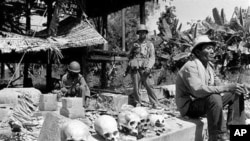In late October, the Extraordinary Chambers in the Courts of Cambodia, or ECCC, a United Nations-backed court also known as the Khmer Rouge Tribunal, has announced that it will begin the hearings in Case Number Two, a trial of the four most senior surviving members of the Khmer Rouge government.
Between 1975 and 1979, Cambodia was governed by a Communist regime known as Democratic Kampuchea. Under the leadership of Pol Pot, Nuon Chea, Ieng Sary, Son Sen and Khieu Samphan, the Khmer Rouge attempted to create a purely agrarian-based society by systematically slaughtering the intelligentsia and forcing much of the population into agricultural labor.
This experiment in social engineering cost the lives of almost 2 million Cambodians.
Both Pol Pot and Son Sen died in the late 1990s, but Nuon Chea, Ieng Sary, Ieng Thirith, and Khieu Samphan are about to stand before a court. The charges against them include genocide, crimes against humanity, religious persecution, war crimes, torture, and murder.
The United States fully supports these proceedings, and is helping to finance the tribunal's operations. In mid-October, U.S. Ambassador-at-Large for War Crimes Issues Stephen Rapp announced the delivery of 1.65 million dollars to the ECCC, the first of three installments of a projected contribution of 5 million dollars by the end of September 2012. The United States has previously contributed nearly 7 million dollars in recent years to support the international portion of the tribunal’s staff and operations. "Given the gravity of the alleged crimes and the level of defendants, this is now the most important trial in the world," said Ambassador Rapp.
"It involves four people who were in the leadership of a government allegedly responsible for murdering 25 percent of their population, almost two million victims. It really is a case of tremendous importance to this country, because this crime affected everybody here, an effort to take this country back to year zero, and people not knowing exactly what happened, why it happened, and how it happened, and I think this case will help answer these questions.
"The United States has been a strong supporter of efforts to bring to justice senior leaders and those most responsible for the atrocities committed under the Khmer Rouge regime in Cambodia," said Ambassador Rapp. "For the sake of the victims of these crimes, it is essential that proceedings in all matters over which that tribunal has jurisdiction be conducted fairly, expeditiously, and independently."
Trial In Cambodia: For The Sake Of The Victims

The Khmer Rouge Tribunal will begin hearings in the trial of the four most senior surviving members of the Khmer Rouge government.



